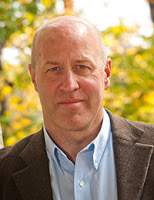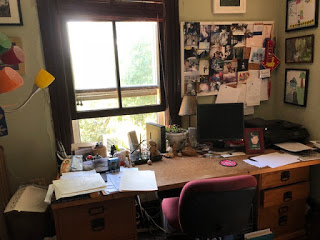I am Paul Hanstedt, and This is How I Work
 Today, I have the pleasure of interviewing Dr. Paul Hanstedt. He holds a Ph.D. in Victorain Literature and is currently the Director of Pedagogical Innovation and the Teaching Collaborative at Roanoke College, where he led the revision of a campus-wide general education program, developed an innovative writing-across-the-curriculum program, and coordinated the implementation of the college’s ePortfolio system. He is the recipient of several teaching awards, received a Fulbright to aid general education curricular revision in Hong Kong, and is co-recipient of a FIPSE grant for sustainable faculty development. He is the author of several books on faculty and curricular development, including General Education Essentials (Jossey-Bass, 2012) and Creating Wicked Students (Stylus, 2018).
Today, I have the pleasure of interviewing Dr. Paul Hanstedt. He holds a Ph.D. in Victorain Literature and is currently the Director of Pedagogical Innovation and the Teaching Collaborative at Roanoke College, where he led the revision of a campus-wide general education program, developed an innovative writing-across-the-curriculum program, and coordinated the implementation of the college’s ePortfolio system. He is the recipient of several teaching awards, received a Fulbright to aid general education curricular revision in Hong Kong, and is co-recipient of a FIPSE grant for sustainable faculty development. He is the author of several books on faculty and curricular development, including General Education Essentials (Jossey-Bass, 2012) and Creating Wicked Students (Stylus, 2018).
Current Job: Professor of English at Roanoke College; Director of Pedagogical Innovation and the Teaching Collaborative; Consultant in Higher Education, specializing in General Education/Liberal Arts, Curricular Reform, and Pedagogical Development (I usually visit between 8-12 different schools a year)
Current Location: Roanoke, Virginia, though I live in Lexington, VA, home of the now famous Red Hen restaurant
Current mobile device: iPhone 9
Current computer: MacBook Air (but also an old old PC desktop that I use to write longer documents)
Can you briefly explain your current situation and research to us?
I’ve been a professor at Roanoke College for 22 years. RC is a small liberal arts college of about 2000 students. For the last 14 years or so I’ve also taken on some mid-level administrative work, largely in the realm of curricular and faculty development. This coming year, for instance, I’ll teach three courses, admin for the equivalent of 2, and use a sixth to pursue my own projects.
In addition, I visit between 8-12 schools a year, helping them with curricular reform and pedagogical development.
My current research is on developing course designs and pedagogical approaches to enhance student authority–that is, their sense of their ability to step into the world as thoughtful agents of change. This has nothing to do with my dissertation. In fact, I haven’t used my dissertation work directly in the last 14 years.
What tools, apps and software are essential to your workflow?
Honestly? I use an old PC desktop for all of my longer writing. I just like sitting at the desk, having that big keyboard clacking in front of me. I write on Microsoft Office Word (365). I don’t use any other apps other than, occasionally, Safari to look up some random fact. I try and keep my phone away from my desk when I’m writing.
What does your workspace setup look like?
I have a fixed workspace in my home. It’s the only place I do major writing. It’s on the top floor, at the back of the house, facing over an old cemetery and some distant mountains. It gets the morning light. My desk is a huge old door set up on two filing cabinets. It’s very cluttered, which is funny, since I used to be very tidy. Now I don’t care any more.
What is your best advice for productive academic work?
Several things come to mind:
1) When writing, imagine a gracious and loving audience. That helps deal with anxiety about not “getting it right.”
2) Allow yourself, in Anne Lamott’s words, a “shitty first draft.” Let it suck. Just turn off the editor/critic and get the words down. Then you have something you can revise.
3) Go for a run or do some form of exercise before you sit down to write. This will lower anxiety and stress.
4) Sometimes light music helps distract that critical nasty questioning part of your brain. I listen to CDs by The National when I write.
How do you keep an overview of projects and tasks?
I keep a jotted list on my desk. I take great pleasure in crossing things off.
Besides phone and computer, do you use other technological tools in work and daily life?
Nope.
Which skill makes you stand out as an academic?
Hmmmmm . . . I guess I’m a communicator? I take pleasure in taking complex ideas and finding ways to make them meaningful/understandable for various audiences–be they students or the resistant faculty member at the back of the room.
What do you listen to when you work?
I love that you ask this! Anything by The National, including SLEEP WELL BEAST, HIGH VIOLET, TROUBLE WILL FIND ME, and BOXER. I also listen to GIVE UP, by the Postal Service
What are you currently reading? How do you find time for reading?
I am currently reading Rory Stewart’s THE PLACES IN BETWEEN.
Until this last sabbatical (that I’m currently coming off of), I did a terrible job of finding time to read. But this year I’ve read probably more books than in the last 22 years! I’m hoping to keep this going as the school year begins by: a) reminding myself how healthy reading is, that it slows down the heart rate and relaxes the breathing, focusing the mind (much like meditation); and b) putting down books that don’t grab my interest. I’m getting older now. I don’t feel obliged to read through something that doesn’t interest me anymore.
Are you more of an introvert or extrovert? How does this influence your working habits?
I appear to be an extrovert, but really am an introvert. I need time by myself to clear my head, read, mull, daydream, write. I can face out and perform, but it is a performance.
Realizing that much of my public work is performative has actually been freeing. I’ve learned to turn it on and be public when I’m in public, being gracious and out-going, knowing that, eventually, I’ll retreat to my lair and recoup.
What’s your sleep routine like?
Shoot for eight hours. Take more if I can get it. Try and avoid less if possible. Naps are lovely.
What’s your work routine like?
Two to four hours in the morning of writing. But that only happens when I’m not teaching. When I’m teaching, all bets are off and life just becomes task task task.
What’s the best advice you ever received?
Be gracious to yourself. Forgive your flaws and mistakes and errors of judgment. Once you do that, it’s easier to be gracious to others.

